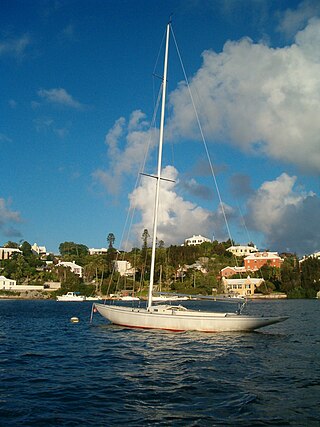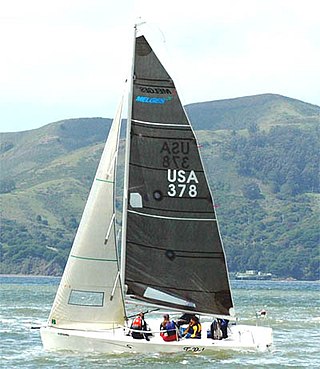
The America's Cup is a sailing competition and the oldest international competition still operating in any sport. America's Cup match races are held between two sailing yachts: one from the yacht club that currently holds the trophy and the other from the yacht club that is challenging for the cup. The winner is awarded the America's Cup trophy, informally known as the Auld Mug. Matches are held several years apart on dates agreed between the defender and the challenger. There is no fixed schedule, but the races have generally been held every three to four years.

Sailing/Yachting made its first appearance as an Olympic sport at the 1900 Summer Olympics after competitions were cancelled at the 1896 Olympics. With the exception of 1904, sailing was thereafter always a part of the Olympic program. The sailing program in 1900 consisted of a total of eight sailing classes. For six classes, the races were scheduled from 20 – 27 May at the river Seine around Meulan, and several series of three races were held for the largest classes from 1–5 August on the North Atlantic off the coast of Le Havre. Approximately 150 sailors in 64 boats from 6 nations competed, including 1 woman, Hélène de Pourtalès, who won a gold medal in the 1 to 2 ton.

The Laser is a class of single-handed, one-design sailing dinghies using a common hull design with three interchangeable rigs of different sail areas, appropriate to a given combination of wind strength and crew weight. Ian Bruce and Bruce Kirby designed the Laser in 1970 with an emphasis on simplicity and performance.

World Sailing (WS) is the world governing body for the sport of sailing recognized by the International Olympic Committee and the International Paralympic Committee (IPC).

The 470 (Four-Seventy) is a double-handed monohull planing dinghy with a centreboard, Bermuda rig, and centre sheeting. Equipped with a spinnaker, trapeze and a large sail-area-to-weight ratio, it is designed to plane easily, and good teamwork is necessary to sail it well. The name comes from the boat's length of 470 centimetres.
Sailing/Yachting is an Olympic sport starting from the Games of the 1st Olympiad. With the exception of the 1904 and the canceled 1916 Summer Olympics, sailing has always been included on the Olympic schedule. The Sailing program of 1908 was open for a total of five sailing classes (disciplines), but actually only four Sailing events were contested. The planned venue of all races, named matches, was Ryde, Isle of Wight.

The J/24 is an international One-Design and Midget Ocean Racing Club trailerable keelboat class built by J/Boats and defined by World Sailing. The J/24 was created to fulfill the diverse needs of recreational sailors such as cruising, one design racing, day sailing, and handicap racing.

The International rule, also known as the Metre rule, was created for the measuring and rating of yachts to allow different designs of yacht to race together under a handicap system. Prior to the ratification of the International rule in 1907, countries raced yachts under their own national rules and international competition was always subject to various forms of subjective handicapping.

Formula Windsurfing is the high-performance, competitive course-racing format of the windsurfing world. This type of sailing boards enjoy a massive wind range that enables racing in winds from 7 to 35 knots, and are capable of reaching speeds of over 30 knots.

Sailing has been one of the Olympic sports since the Games of the I Olympiad, held in Athens, Greece, in 1896. Despite being scheduled in the first Olympic program, the races were canceled due to severe weather conditions. Apart from the 1904 Summer Olympics, sailing has been present in every edition of the Olympic Games.

The International One Design is a class of sail boat developed in 1936 for yacht racing. It is a 33-foot open-cockpit day sailer used for day racing, rather than for overnight or ocean races. Popularised prior to the Second World War, the International One Design class is considered a classic one today.

The International Six Metre class is a class of classic racing yachts. Sixes are a construction class, meaning that the boats are not identical but are all designed to meet specific measurement formula, in this case International rule. At their heyday, Sixes were the most important international yacht racing class, and they are still raced around the world. "Six metre" in class name does not, somewhat confusingly, refer to length of the boat, but product of the formula; 6mR boats are, on average, 10–11 metres long.

The term sportsboat first appeared in the late 1980s and early 1990s to describe trailer sailers that were optimised for high performance at the expense of accommodation and ballast. The very definition of the term "sportsboat" is evolving.

The 2008 Vintage Yachting Games was the first post-Olympic multi-class sailing event for discontinued Olympic classes. The event took place on the IJsselmeer of Medemblik, the Netherlands, from 20 September to 27 September 2008. A total of 66 sailors in 47 boats from 17 countries showed up to compete in six Vintage Yachting Classes

The Louis Vuitton Trophy was a series of four match race regattas in International America's Cup Class boats, held between November 2009 and November 2010.

The sport of sailing involves a variety of competitive sailing formats that are sanctioned through various sailing federations and yacht clubs. Racing disciplines include matches within a fleet of sailing craft, between a pair thereof or among teams. Additionally, there are specialized competitions that include setting speed records. Racing formats include both closed courses and point-to-point contests; they may be in sheltered waters, coast-wise or on the open ocean. Most competitions are held within defined classes or ratings that either entail one type of sailing craft to ensure a contest primarily of skill or rating the sailing craft to create classifications or handicaps.
The Finn Gold Cup is the premier competition in Finn Class sailboat racing. Organized by the International Sailing Federation, it decides the Finn World Championships and has been held every year since 1956.

Virtual Regatta is an online web browser sailing race simulator, though the development of a mobile app version of the game has seen a significant number of users shift to this platform in recent years.

The Star Sailors League (SSL) is a sports governing body in sailing in charge of the SSL Ranking, the SSL Circuit and the SSL Gold Cup.
Sailing at the 2015 ASEAN Para Games was held at Marina Bay, Singapore, from 6 to 8 December 2015. There were initially 4 gold medals for the 4 boat classes: single-person dinghy - Hansa 2.3 Men and Hansa 2.3 Women; Open Hansa 303 plus the International 2.4mR. Not enough countries entered for the 2.4mR class, so this event was cancelled.















